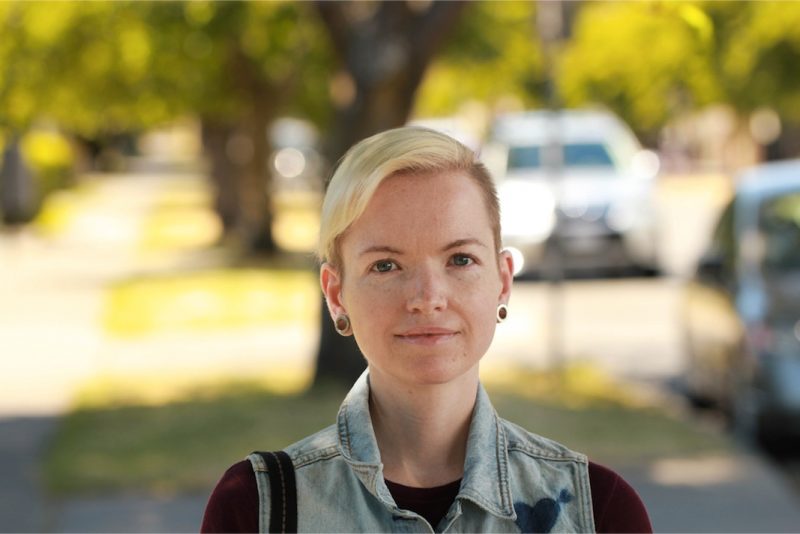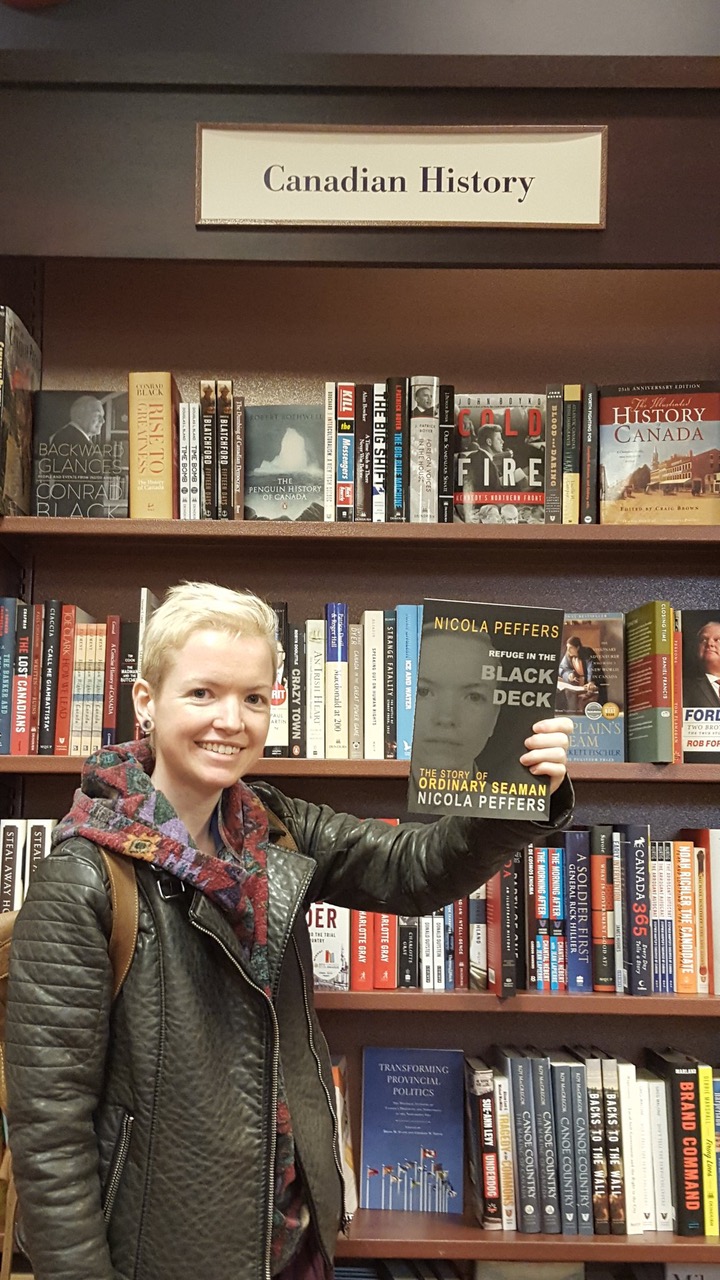The young woman and the sea
A female ex-cop reviews Nicole Peffer's harrowing memoir about harassment in the navy.
January 16th, 2018

Nicola Peffers in the Royal Canadian Navy, 2009, before seeking refuge in the black deck.
Refuge in the Black Deck also illustrates how the women of Canada’s military are still required to prove themselves in ways that men seldom are before being accepted as equals in serving their country.
Refuge in the Black Deck: The Story of Ordinary Seaman Nicola Peffers
by Nicola Peffers
Halfmoon Bay: Caitlin Press.
$24.95. / 978-1-987915-43-3
Reviewed by Bonnie Reilly Schmidt
*
 Readers are immediately immersed in life aboard an armed forces navy vessel in Refuge in the Black Deck: The Story of Ordinary Seaman Nicola Peffers in much the same way author Nicola Peffers experienced it in 2009. During her six-month NATO deployment as a rookie marine technician aboard the HMCS Winnipeg, we learn about Canada’s aging marine vessels, worn out equipment, and the politics behind answering distress calls in international waters right along with her.
Readers are immediately immersed in life aboard an armed forces navy vessel in Refuge in the Black Deck: The Story of Ordinary Seaman Nicola Peffers in much the same way author Nicola Peffers experienced it in 2009. During her six-month NATO deployment as a rookie marine technician aboard the HMCS Winnipeg, we learn about Canada’s aging marine vessels, worn out equipment, and the politics behind answering distress calls in international waters right along with her.
Descriptions of the noises, the smells, the swaying of the ship, the vastness of the ocean, and the blackness below decks, are all brought to our attention to great effect. Readers learn how it is possible to lose all sense of time and space when working for long stretches of time without daylight; about strapping yourself into your “rack” at night while sleeping; and understanding “navy speak” with the help of an indispensable glossary. We have little time to adjust to our surroundings and we are caught off balance as though we are at sea working right along with Peffers. This is a credit to her engaging style of writing and a central strength of the book.
As interesting as this immediate immersion is, however, readers are left without the context necessary to ground Peffers’ experiences. We are told very little about her life prior to joining the Canadian navy except that she wanted to serve her country on a ship and in a peacekeeping role away from war zones. In addition, there is nothing in the book that describes her recruit training. This is a significant omission that would help to explain, in part, military culture where rank and tradition are paramount, initiative is stifled, rules are closely followed, commands are obeyed, and individualism minimized for the sake of group identity.
A description of recruit training would have helped readers understand why Peffers eventually faced two counts of insubordination for speaking out, and why her performance was considered poor for what most civilians would characterize as minor infractions. Perhaps more importantly, we are left to wonder why Peffers, who most assuredly would have been exposed to these core cultural values at the basic training level, seemed so unprepared for life on the Winnipeg.
Having said that, no one could be totally prepared for the culture that Peffers entered. The harassment she experienced demonstrates that human rights can be legislated, but cultural and social practices are slow to change. Sexual harassment of the female staff deployed on the Winnipeg took many forms: sexual comments, jokes, propositions, groping, announcements of masturbation contests, rape fantasies, and cupcakes created by the ship’s cook that were shaped like male genitalia. Peffers was also made to feel she didn’t belong in the navy as rumours about her poor attitude and questionable abilities circulated throughout the ship. She soon discovered that “Appearances are all you have in the military because no one gets fired,” and this was certainly true for her harassers on the Winnipeg. Victims were simply transferred.
Descriptions of loneliness and feeling trapped dominate the narrative as her time at sea draws on. Which is why it is surprising that she seeks refuge in the “black deck.” It is a dark, hot, dirty, and dangerous place, one that she does not frequent as often as the title of the book would suggest. Some readers may view her few trips to the black deck as contributing to her feelings of being trapped rather than a place where she is at peace. But it is also the place where readers wonder if Peffers is considering suicide, which she later attempted after her deployment.
A stirring part of the book is Peffers’ fight with Veterans Affairs Canada for disability benefits after her discharge. A misdiagnosis of bipolar disorder, rather than post-traumatic stress disorder, is an example of the lengths that the Canadian government will go to deny benefits to personnel involved in peacekeeping rather than armed conflicts. These denials preserve the image of our military forces as strong, fit, and invincible representatives of a virile country, an image that has been in the making for more than one hundred years.
Peffers’ honesty about her suicide attempt and her struggle with addiction post-discharge prove that she was more than just a “weak little girl” on a ship designed for men, but an intelligent and sensitive human being with a strong motivation to succeed in life. Refuge in the Black Deck illustrates how the women of Canada’s military are still required to prove themselves in ways that men seldom are before being accepted as equals in serving their country.
*
Bonnie Reilly Schmidt worked as a police officer with the Royal Canadian Mounted Police between 1977 and 1987. She returned to post-secondary education later in life, earning a BA from the University of the Fraser Valley (UFV), a Master’s from Simon Fraser University (SFU), and a Ph.D. in Canadian History in 2014, also from SFU. As a Social Sciences and Humanities Research Council of Canada scholar, Bonnie Reilly Schmidt was also the recipient of the prestigious Dean of Graduate Studies Convocation Medal for Academic Excellence from SFU for her Ph.D. dissertation “Women in Red Serge: Female Police Bodies and the Disruption to the Image of the RCMP.” In 2014, she was also voted one of UFV’s Top 40 Alumni. Bonnie has spoken at a number of academic conferences since 2005. She has written book reviews for BC Studies as well as articles for the Journal of the Canadian Historical Association and Canada’s History Magazine. Bonnie has given numerous media interviews about women in the RCMP for Maclean’s, The Vancouver Sun, the Canadian Press, and Global TV (Vancouver). Her first book is Silenced: The Untold Story of the Fight for Equality in the RCMP (Caitlin Press 2015).
*
The Ormsby Review. More Readers. More Reviews. More Often.
Reviews Editor: Richard Mackie
Reviews Publisher: Alan Twigg — BC BookWorld / ABCBookWorld / BCBookLook / BC BookAwards / The Literary Map of B.C. / The Ormsby Review
The Ormsby Review is a new journal for serious coverage of B.C. literature and other arts. It is hosted by Simon Fraser University. The Advisory Board consists of Jean Barman, Robin Fisher, Cole Harris, Wade Davis, Hugh Johnston, Patricia Roy, David Stouck, and Graeme Wynn.
“Only connect.” – E.M. Forster








Leave a Reply